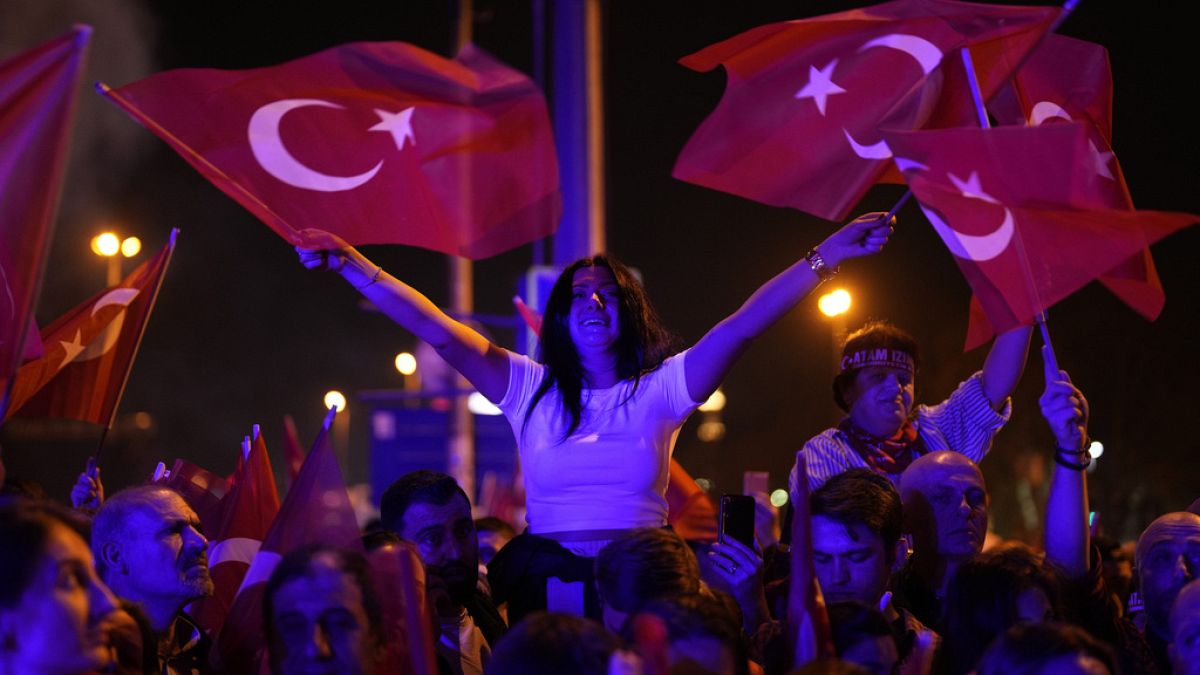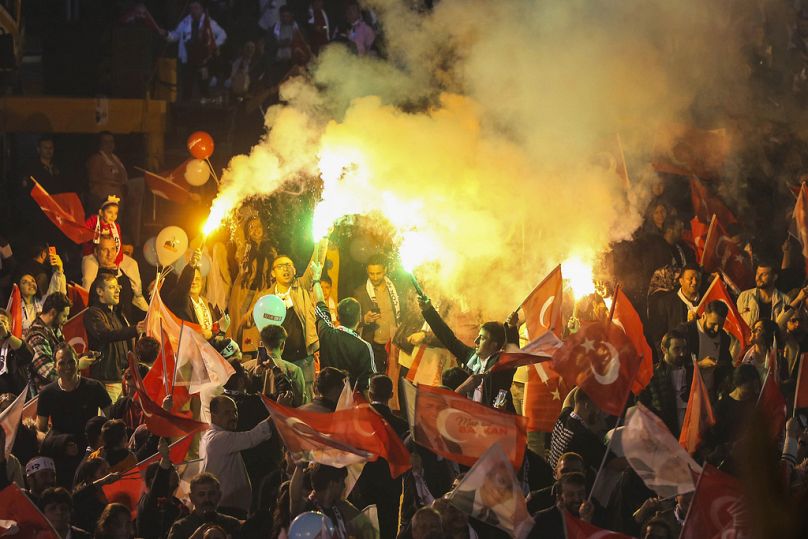Erdogan acknowledged the electoral setback in a speech, saying his party had suffered “a loss of altitude” across Turkey.
Turkey's main opposition party retained its control over key cities and made huge gains elsewhere in local elections on Sunday.
The results are a major upset for President Recep Tayyip Erdogan, who had set his sights on retaking control of those urban areas.
With more than 90% of ballot boxes counted, incumbent Istanbul Mayor Ekrem Imamoglu, of the Republican People's Party (CHP) led by a wide margin in Turkey's largest city and economic hub, according to the state-run Anadolu Agency.
Mansur Yavas, mayor of the capital, Ankara, retained his seat with a stunning 25-point difference over his challenger, the results indicated.
In all, the CHP won the municipalities of 36 of Turkey's 81 provinces, according to Anadolu, making inroads into many strongholds of Erdogan's party.
It gained 37% of the votes nationwide, compared to 36% for the president's party, marking the CHP's greatest electoral victory since Erdogan came to power two decades ago.
Erdogan acknowledged the electoral setback in a speech, saying his party had suffered “a loss of altitude” across Turkey. The people delivered a “message” that his party will “analyse” by engaging in “courageous” self-criticism, he said.
“Unfortunately, nine months after our victory in the May 28 elections, we could not get the result we wanted in the local election test,” Erdogan added. “We will correct our mistakes and redress our shortcomings.”
He vowed to press ahead with an economic programme introduced last year that aims to combat rampant inflation that has ravaged the country and hit Turks hard.
The vote was seen as a barometer of Erdogan’s popularity as he sought to win back control of key urban areas he lost to the opposition in elections five years ago.
The main battleground for the 70-year-old Turkish president was Istanbul, a city of 16 million people where he was born and raised.
Divided and demoralized after the victory of Erdogan's ruling Islamic-oriented Justice and Development Party (AKP) in last year’s presidential and parliamentary elections, the result has boosted Turkey's opposition.
“The voters decided to establish a new political order in Turkey,” CHP leader Ozgur Ozel told a crowd of jubilant supporters. “Today, the voters decided to change the 22-year-old picture in Turkey and open the door to a new political climate in our country.”
Some 61 million people, including more than a million first-time voters, were eligible to cast ballots for all metropolitan municipalities, town and district mayorships as well as neighbourhood administrations.
Turnout was around 76%, according to the state-run Anadolu Agency, compared to 87% last year.
Some 594,000 security personnel were on duty across the country to ensure the vote went smoothly. Nevertheless, one person was killed and 11 others hurt in the city of Diyarbakir where a dispute over the election of a neighbourhood administrator turned violent, the state-run Anadolu Agency reported. At least six people were also injured in fighting that erupted in the nearby province of Sanliurfa.
“According to the data we have obtained, it seems our citizens’ trust in us, their faith in us has paid off,” Istanbul mayor Imamoglu said.
He won 50.6% of the votes in Istanbul, while AKP candidate Murat Kurum, a former urbanisation and environment minister, received 40.5%, according to Anadolu.
Opinion polls had pointed to a close race between the two.
Imamoglu, a popular figure touted as a possible future challenger to Erdogan, ran without the support of some of the parties that helped him to victory in 2019. Both the pro-Kurdish Peoples’ Equality and Democracy Party and the nationalist IYI Party fielded their own candidates.
A six-party opposition alliance that was led by CHP disintegrated after it failed to oust Erdogan in last year's election.
It was unable to capitalise on the economic crisis and the government’s initially poor response to last year's devastating earthquake that killed more than 53,000 people.
Ulgen said the result has thrust Imamoglu into the role of possible leader of the opposition to challenge Erdogan for the presidency in 2028.
“This outcome has certainly been a watershed for Imamoglu,” he said. "He will emerge as the natural candidate of the opposition for the next round of presidential elections."
The new religious-conservative New Welfare Party (YRP) attracted votes from AKP supporters, disillusioned with the government's handling of the economy.
In Turkey's mainly Kurdish-populated southeast, the DEM Party was on course to win many of the municipalities but it's unclear whether it would be allowed to retain them. In previous years, Erdogan’s government removed elected pro-Kurdish mayors from office for alleged links to Kurdish militants and replaced them with state-appointed trustees.
Analysts said a strong showing for Erdogan’s party would have hardened his resolve to usher in a new constitution - one that would reflect his conservative values and allow him to rule beyond 2028 when his current term ends.
Erdogan, who has presided over Turkey for more than two decades - as prime minister since 2003 and president since 2014 - has long been accused of taking the country towards authoritarianism.

